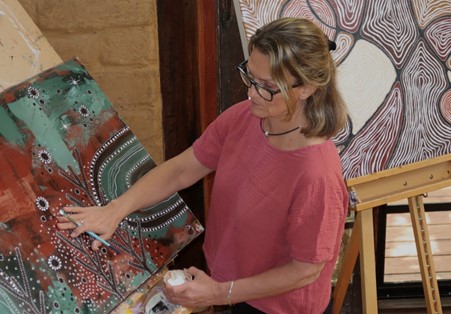Artist Melissa Henry gains confidence in licensing her artwork

Melissa Henry is a talented contemporary Aboriginal artist, located on Yuin Country on the South Coast of NSW (see her website, Milumba Arts). She lives on Country and draws her inspiration from her surroundings, her elders and ancestors. Melissa had recently had two works shortlisted for the 2024 National Contemporary Art Prize
Melissa had not previously licensed her art because she did not feel that she understood licensing contracts. However, in 2024, Melissa was approached by a company to assign or license her artwork. She remembered attending an Arts Law workshop for artists about copyright and decided to reach out to Arts Law for help.
Arts Law explained the difference between the sale of her physical artwork and her copyright rights, and the difference between an assignment of her copyright and a licence of copyright.
An artwork is separate to copyright. When an artist sells an artwork, this does not automatically include a transfer of the artist’s or rightsholder’s copyright rights. You can transfer, or assign, your copyright, which means you no longer control it, or you can give a permission to someone else to use their copyright. This is called a licence. You can read more about copyright in Arts Law’s information sheet on Copyright.
Arts Law helped Melissa to understand the key things to consider in a licensing contract, such as exclusive and non-exclusive licences, the scope and duration of a licence and the different ways in which an artist can be paid for a licence.
The Arts Law lawyer also explained to Melissa that she was within her rights to negotiate the licence and suggest changes to the company. Melissa said “I did not realise that each contract could be tailored. I thought that a licence was a licence. I now know that you can tailor licences to suit each project”.
Melissa is now open to new licensing opportunities and is confident in thinking about licensing opportunities in the future.
Melissa said:
“Previously, I had said “no” to licensing opportunities because I did not understand them. If I did not speak to Arts Law, I would have kept saying “no”. I now feel a lot more confident. I have a better understanding and know what types of questions I should be asking up-front. I now feel better educated in this area.
I was blown away and so grateful for the help from Arts Law. I could not believe that this type of help was there. I spoke to Arts Law multiple times, and I would not have even looked at the contract and would not have been able to progress things if it had not been for Arts Law.”
A copyright licence is a form of contract, and the terms of the licence can be negotiated. Important terms include the scope of a licence (what can the person receiving the licence do), the term (how long for), whether a licence is exclusive or non-exclusive and how the artist will be credited . You can read more about licensing in Arts Law’s information sheet on Licensing, which includes a handy licensing checklist.



